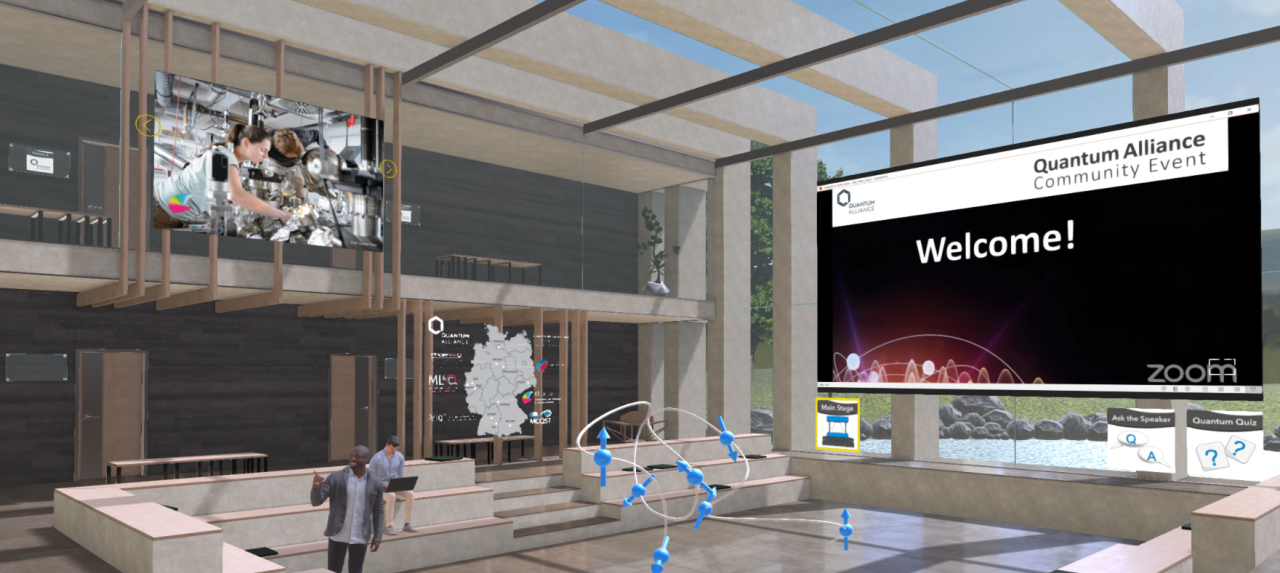Zoom
4 December 2024
from 11:00
to 13:00
A networking event for the quantum science community.
Address / Location
Online
Networking Event for the Quantum Science Community
Quantum Alliance Community Networking Event
You will have the opportunity to (re-)connect with early-career scientists from all over Germany and get insights into the job market for PhDs and Postdocs in Germany. In 10-minute talks, alumni of our member institutions will give an overview of the challenges and advantages of leaving the university to work in industry or a government lab and the do's and don'ts during the application process. Following this there will be a general panel discussion followed by networking sessions.
Program
10:45 - 11:00 | Log in and Introductions
11:00 - 11:05 | Welcome by the Quantum Alliance Team
11:05 - 11:45 | Main Stage: My Path from Academia to Industry
- Johannes Greiner | IBM Quantum Enabling Technologies Hardware Lead
- Benno Rem | Head of Development at Spectrum Instrumentation GmbH
- Tilman Schwemmer | Scientist at Zeiss
- Elisabeth Wybo | Tech Lead Optimisation at IQM
11:45 - 12:00 | Panel Discussion with Alumni
12:00 - 12:30 | Breakout Rooms: Networking Session with one alum per room
Change breakout rooms to connect with other alumni!
Meet the speakers
 | Johannes Greiner Dr. Johannes Greiner specializes in Quantum Computing at IBM, where he works on integrating quantum computing with partners and users worldwide. With a background in Quantum Technology from Uni Stuttgart and King’s College London, he has contributed to deploying Europe’s first commercial quantum computer. His work focuses on aligning software workflows, enabling the use of IBM Quantum Services, and fostering innovation among startups and other industrial players. Johannes aims to make quantum computing accessible and impactful. Connect with Johannes on LinkedIn. |
 | Benno Rem After finishing his physics studies at the University of Amsterdam, NL, Benno Rem did his PhD in experimental quantum physics at the Laboratoire Kastler-Brossel in Paris, FR. There, he researched strongly interacting ultra-cold atoms and laser cooling of atoms. From 2013 until 2018, he was a Postdoc and Marie-Curie Research Associate at the University of Hamburg and the Center for Ultrafast Imaging (CUI), working on topological phases in triangular lattices as well as using machine learning for detecting (topological) phases and phase transitions in ultra-cold matter. In 2018, he transitioned from academia to industry, and started working at the R&D department of a company that specializes in (laser) marking of plastics and metals. In 2023, Benno Rem joined Spectrum Instrumentation, a company that develops ultrafast acquisition and generation electronics for academia and industry, and is part of the Rymax One Collaboration. |
 | Tilman Schwemmer Tilman Schwemmer studied physics at the Julius Maximilian University of Würzburg. As part of his master’s program, he spent six months at the University of St Andrews. From 2019 to 2023, Tilman conducted research at the chair of Prof. Dr. Ronny Thomale, using numerical renormalization group methods to study unconventional and topological superconductors. In 2023, he earned his doctorate with his dissertation on 'Relativistic corrections of Fermi surface instabilities.' Since July 2023, he has been working as a scientist at ZEISS in the 'Semiconductor Manufacturing Technology' (SMT) division, where he applies his expertise to the simulation of optical systems for photolithography. |
 | Elisabeth Wybo Elisabeth Wybo did her PhD at the Technical University of Munich in the field of quantum many-body physics. In October 2022, she started working at IQM, a leading European quantum company building full-stack quantum computers based on superconducting qubits. She works there as Tech Lead Optimisation focusing on the development of quantum algorithms for optimisation problems. Such problems are prominently present in many different fields, ranging from real-world cases in e.g. finance or logistics to fundamental science. Elisabeth is investigating which approaches could provide quantum utility in the near future by using various numerical and analytical techniques. |
